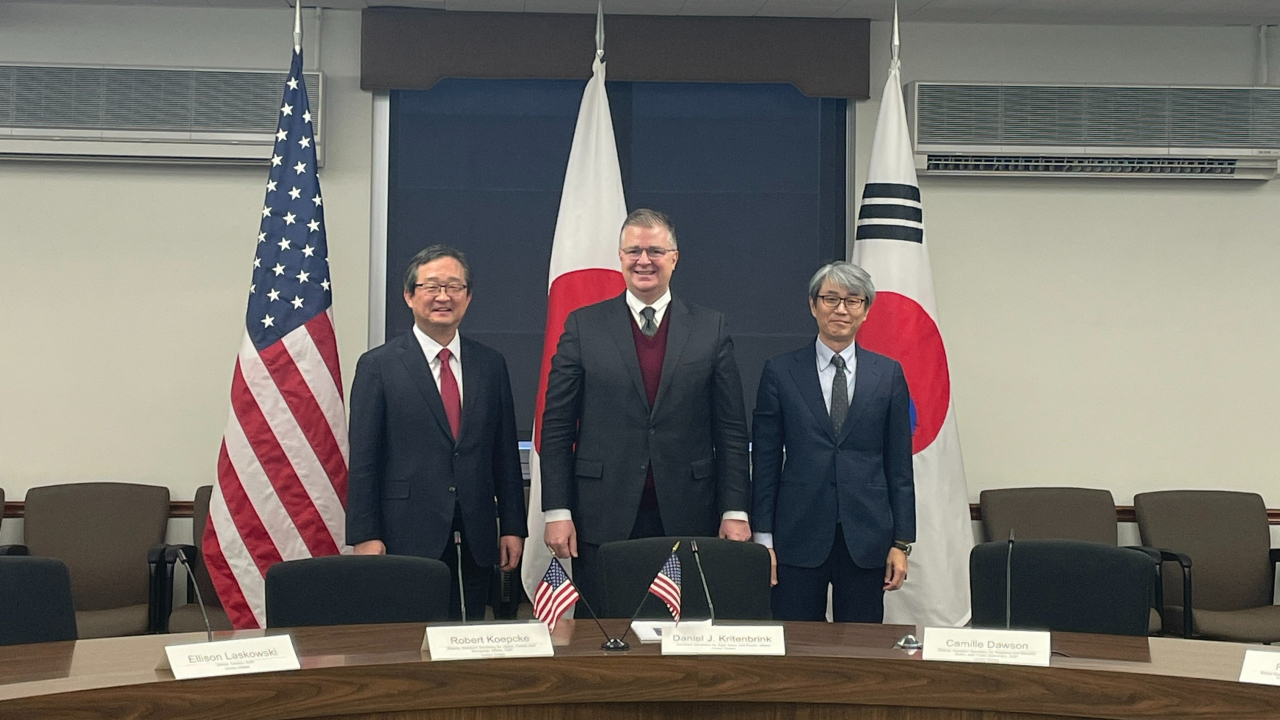S. Korea, US, Japan address China, NK, Russia at 1st Indo-Pacific Dialogue
By Ji Da-gyumPublished : Jan. 7, 2024 - 12:16

South Korea, the United States and Japan jointly condemned deeper military cooperation between Russia and North Korea, and reaffirmed the importance of peace and stability across the Taiwan Strait during the first Indo-Pacific Dialogue.
The three governments held the inaugural trilateral Indo-Pacific Dialogue in Washington on Friday, following up on the agreement established during the Camp David summit in August last year.
The leaders of South Korea, the US and Japan previously agreed to launch the dialogue platform aimed at coordinating the implementation of Indo-Pacific approaches and continually identifying new areas for common action in the joint statement, titled "Spirit of Camp David."
South Korean Deputy Foreign Minister Chung Byung-won, US Assistant Secretary of State for East Asian and Pacific Affairs Daniel Kritenbrink and Japanese Deputy Foreign Minister Yasuhiro Kobe attended the first meeting.
The representatives discussed key regional matters, shared their respective assessments on geopolitical trends shaping the Indo-Pacific and emphasized the significance of the need for enhanced trilateral cooperation, according to a joint press release issued Saturday under the name of the three governments, following the dialogue.
Illicit actions that contravene international rules by China, Russia and North Korea were addressed during the trilateral meeting.
"They condemned the DPRK's continued development of its unlawful nuclear and ballistic missile programs, growing military cooperation with Russia, and grave human rights violations and abuses," the joint press release said, referring to North Korea's official name, the Democratic People's Republic of Korea.
The Indo-Pacific Dialogue notably took place just a day after the US disclosed that North Korea had recently supplied Russia with several dozen ballistic missiles as well as missile launchers. The ballistic missiles from North Korea were subsequently employed by Russian forces in attacks on Ukraine on Dec. 30, 2023, and Jan. 2 this year.
The joint statement also "reaffirmed the importance of peace and stability across the Taiwan Strait as indispensable to security and prosperity in the international community."
Additionally, the document referenced the publicly declared positions of the three countries regarding the "recent dangerous and escalatory behavior supporting unlawful maritime claims by the PRC in the South China Sea," referring to China by its official name, the People’s Republic of China.
"They strongly reiterated their firm commitment to international law, including the freedom of navigation and overflight," the statement said, reiterating their opposition to "any unilateral attempts to change the status quo by force or coercion anywhere in the waters of the Indo-Pacific."
The three representatives discussed concerns such as the escalating crisis in Myanmar and advocating for coordinated efforts to combat climate change.
Seoul, Washington, and Tokyo highlighted the importance of collaborating with Indo-Pacific partners on key issues, such as information and communications technology, cybersecurity and emerging technology. They specifically acknowledged South Korea's hosting of the AI Safety Summit and the Global AI Forum in 2024 as a significant platform for such engagements.
The three also discussed ways to effectively counter the "increased threat posed by foreign information manipulation."
The three countries reaffirmed their intent to continue to hold the trilateral dialogue annually as the outcome of the inaugural dialogue.
"The three countries commit to enhancing alignment in strategic awareness and policy coordination on common interests in the region by institutionalizing the Indo-Pacific dialogue, with this meeting serving as the inaugural step," South Korea's Foreign Ministry said Saturday in a separate press statement.
The ministry said the dialogue is the platform for "instituting supporting policy coordination and cooperation within the comprehensive regional strategic framework of the three countries."
The launch of the trilateral dialogue, therefore, was assessed to "have laid the groundwork for the three countries' substantive contributions to the stability and prosperity of the Korean Peninsula, the Indo-Pacific region and beyond," according to the Foreign Ministry.



















